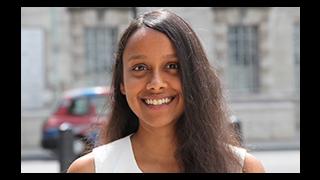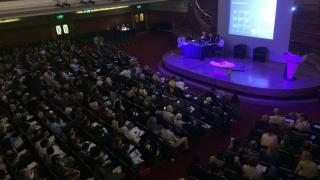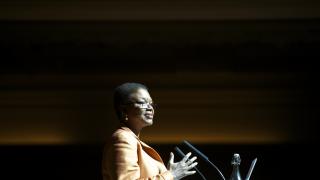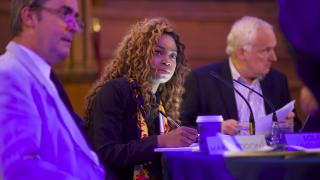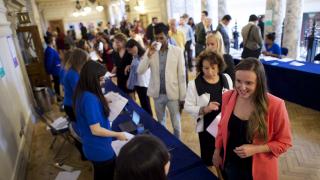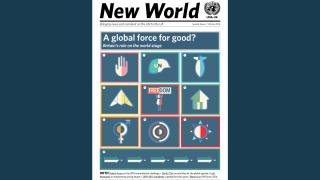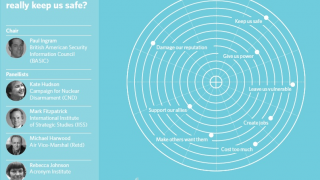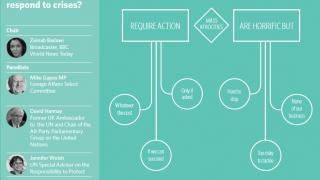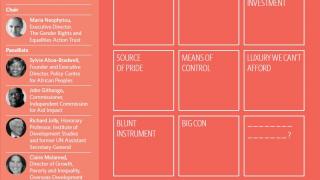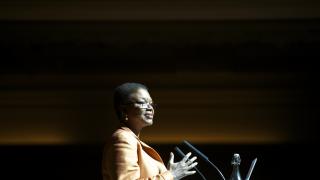
Abridged, edited transcript of the speech by the UN Under-Secretary-General for Humanitarian Affairs. A recording of the full speech is available at www.una.org.uk/forum.
I am so pleased to be participating in an event of this kind in the UK – a country which has sought to support the UN over many years. I will say a few things about why I think the UN remains important and why it remains important here in Britain.
It is easy to be sceptical about the UN and to question its relevance. When we see the UN in the news it is very often the portrayal of a failure of the UN machinery and we don’t generally distinguish between the different parts of the UN, the different agencies, the 193 Member States. The UN’s governance also doesn’t necessarily reflect the current global reality.
What really worries me, though, is when people seem to feel that the issues the UN deals with aren’t quite as important anymore. Perhaps it is because the stability we have here in the UK makes many of the conflicts around the world seem a very long way away. I feel the UN’s role in promoting peace and security is still front and centre of what we need to do.
The world is going through turbulent times. In Iraq, more than one million people have been driven from their homes in recent months. In Syria, a staggering 10.8 million people – nearly half the population – are in desperate need of humanitarian help. Three million have already fled the country. I deal with the crisis in Syria on a daily basis and I can’t quite grasp the fact that in three years we’ve gone from one million in need to 10.8 million, and we still don’t seem able to deal with it.
We’ve seen what’s been unfolding in Ukraine, the rise of violence in west and central Africa, and an arc of hotspots that could easily join up: Kenya, Somalia and South Sudan. Next year, we will celebrate the UN’s 70th anniversary. We will set new targets to replace the Millennium Development Goals. Eradicating extreme poverty: we are the first generation that could actually do it. We will try to reach a new agreement on climate change. Nuclear disarmament, women’s empowerment, peacebuilding, peacekeeping, humanitarian assistance, tackling sexual violence in conflict – all of this is on the UN’s agenda.
When I get depressed, I go back to the UN’s founding principles, which centre on the importance of people. The opening words of the UN Charter are “we the peoples”. It makes commitments on saving future generations from the scourge of war, on human rights and tolerance. It is an aspiration for a better world.
The UN was borne out of a desire to prevent conflict, and despite the conflicts that continue, it has seen some significant successes: Sierra Leone, Liberia, Nepal and Timor-Leste. We forget those successes because we despair at our inability to prevent. And we should. There should be more prevention. We should take seriously the collective commitments we made to our responsibility to protect. We think and talk about Rwanda and Srebrenica but we still don’t have peace in Syria or Israel-Palestine.
We have succeeded in making certain weapons and war practices illegal. Landmine are now considered inhumane and indiscriminate weapons of war. 161 states have signed up to the landmine treaty. Several armed groups have agreed to end the use of children in conflict. Two years ago, senior military officers in the Democratic Republic of the Congo were charged with offences including rape and sexual violence. The International Criminal Court convicted a former head of state – Charles Taylor – of war crimes.
The United Nations has 120,000 peacekeepers in 16 countries. We have vaccinated more than half the world’s children against deadly diseases, saving an estimated 2.5 million lives a year. The UN’s maternal health campaign saves around 30 million lives a year.
We should be proud of those achievements. But often, people’s activism focuses on fragmentation. Governments talk in terms of narrow nationalism, rather than addressing global issues. Our world is interconnected. We cannot get away from that. Immigration and terrorism are two good examples. They are seen as domestic but they are transnational. Extreme weather events, epidemics – they don’t recognise borders. They require international cooperation. The governance of the internet – the privacy of users – cannot be decided by any one government.
If that hasn’t convinced you to care about the UN, let me give you three stories. Two years ago, I visited a refugee camp in Kenya that hosts hundreds of thousands of Somali refugees. I met a woman that had just arrived. She could barely speak, she was totally traumatised. She had fled violence and starvation. I found out later that she had left Somalia with five children but had arrived at the camp on her own. She had lost them all on the way. The only thing that stood between her dying was the work of the UN, supported by the government of Kenya and international donors, including the UK.
I have now visited Syria seven times. I have been to its neighbouring countries – Lebanon, Turkey, Iraq and Jordan – many times. I cannot describe to you how it feels to sit and listen to a group of mothers who tell you that they had to marry their daughters off at age 12 or 13 because they were so concerned for their safety. They felt they could not protect them as they were fleeing the violence in Syria.
Last year I was in Yemen. I’m not sure why this particular story has affected me more than all the others I listen to day in and day out, but I arrived in the middle of a huge controversy because an eight-year-old girl had been married to a man of over 40 and she had died on her wedding night because of internal injuries. I went back to my hotel room and I cried and cried. We need the UN to set standards and to voice our collective opinion as to what we think is completely inappropriate.
We have moved a long way in the UK. None of us can actually remember children having to go and work in the coalmines. We read about it in our history books. But these things are happening every day across the world.
So I hope the British public is proud of this country’s aid efforts and commitment to the UN. Yes, the UK approaches political issues in a political way. Yes, the UK puts its national interests first – every single UN member state does – but we live in a country that believes in human rights, in democracy and in the right of people to exercise their free will. That does not exist in many countries.
At the end of last year, we had 32.2 million people displaced in their own countries. We had 16.7 million refugees. We had 20 million people in the Sahel who did not have enough to eat. I really believe it is not asking too much to take seriously our global responsibilities.
The UN is where we go to try and work on all of these issues, from climate change to population growth to the urgent peace and security issues that reach the Security Council. The UN deals with the most difficult problems in the world. We do it imperfectly but I am passionate about the importance of the UN because if we didn’t have a global forum that was set up to talk about prevention we would be in an even worse place. We need your commitment and support to reform, to innovate and to challenge ourselves to do our best for the people in our world.

